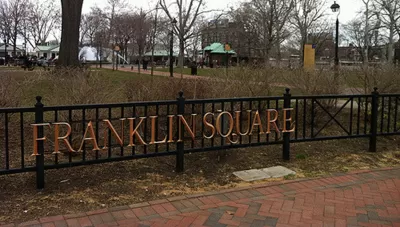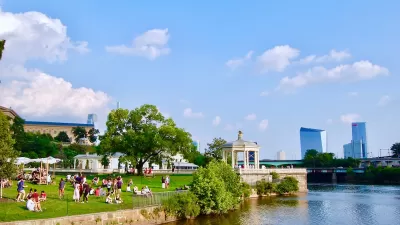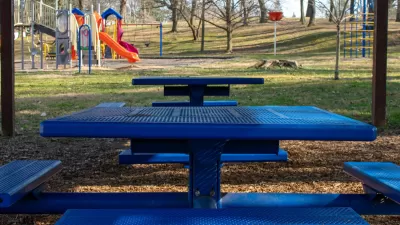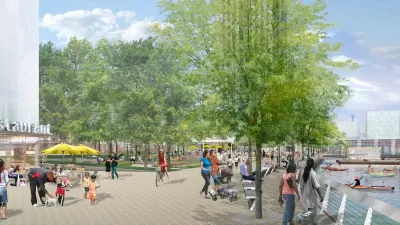Philadelphia's Franklin Square will require admission in the evening this spring, for the duration on a Chinese lantern festival. A critic faults the "philosophy of privatism" for robbing the park of its democratic qualities.

Philadelphia Inquirer Architecture Critic Inga Saffron establishes the stakes in a controversy over an ongoing festival in Franklin Square:
Urban parks are the physical embodiment of our democratic system, maybe the only place in our increasingly lopsided society where rich and poor can come together as equals. Anyone can walk into an urban park, sit on a bench, and enjoy the sunshine, gratis. At least, that's how it is supposed to work.
Those ideals run counter to the current state of Franklin Square, according to Saffron, which until June 12 is surrounded by a chain-link fence and a black curtain. "The enclosure, which looks like something you would find at a top-secret construction site, was installed last week so the park's nonprofit manager, Historic Philadelphia Inc., could lease the public square to a private company for a nightly Chinese lantern festival," explains Saffron.
Saffron argues that "parks exist to provide city-dwellers with a green respite, not do yeoman's work for the economy" before providing a brief history of how it came to be that cities turned parks into test beds for public-private partnerships.
Stephen Salisbury, culture writer for the Inquirer, also wrote about the event's effects in Franklin Square earlier in April.
FULL STORY: Changing Skyline: The public cost of privatizing Philadelphia's parks

Trump Administration Could Effectively End Housing Voucher Program
Federal officials are eyeing major cuts to the Section 8 program that helps millions of low-income households pay rent.

Planetizen Federal Action Tracker
A weekly monitor of how Trump’s orders and actions are impacting planners and planning in America.

Ken Jennings Launches Transit Web Series
The Jeopardy champ wants you to ride public transit.

California Invests Additional $5M in Electric School Buses
The state wants to electrify all of its school bus fleets by 2035.

Austin Launches $2M Homelessness Prevention Fund
A new grant program from the city’s Homeless Strategy Office will fund rental assistance and supportive services.

Alabama School Forestry Initiative Brings Trees to Schoolyards
Trees can improve physical and mental health for students and commnity members.
Urban Design for Planners 1: Software Tools
This six-course series explores essential urban design concepts using open source software and equips planners with the tools they need to participate fully in the urban design process.
Planning for Universal Design
Learn the tools for implementing Universal Design in planning regulations.
Ada County Highway District
Clanton & Associates, Inc.
Jessamine County Fiscal Court
Institute for Housing and Urban Development Studies (IHS)
City of Grandview
Harvard GSD Executive Education
Toledo-Lucas County Plan Commissions
Salt Lake City
NYU Wagner Graduate School of Public Service





























